does anyone know how our ancestors made scabbard chapes.
#1 was the chape made of a single peace of thin mettle hammered into the perfect shape, single peace bent around the scabbard sealed at the back or two separate peaces like is often done today?
#2 how was the edges of the chape secured together (two peaces or one bent around), was it hammer forged together?
#3 how was the chape secured to the scabbard (glue, friction)?
if their is anything i'm forgetting to ask please put it in
thanks
When and where makes for a big difference in the answer.
Shane
Shane
should have clarafied that, vicking piriod through the high middle ages
if there are any diforences during thist vast amount of time i would like to know
if there are any diforences during thist vast amount of time i would like to know
Lost wax casting, near as I can tell, if you're talking 'bout these ubiquitous Viking ones:
[ Linked Image ]
The nose on the upper animal head is turned in on these, so the chape has a built-in staple effect to hold it on.
[ Linked Image ]
The nose on the upper animal head is turned in on these, so the chape has a built-in staple effect to hold it on.
Hi.............Well, its the same for many items in the past.......there are many answers. I belirve that the Vilings and other migration period groups were into casting these and other fittings but there is no single way, generally speaking. Some chapes were formed over stakes from sheet stock some were cast They were sometomes left plain or the edges were filed with a pattern or they were pierced or tooled or repoussed. Some were in steel or brass-bronze or copper. They were then either glued and/or pinned on. Some of the sheet chapes were joined with a brazed seam up the back, others were left un-joined. Other designs simply wrapped around the edge like a big letter " U " or a "V ". Certinally all of these were being done concurrently. It also depended if the item was for a footsoldier or a Baron who might have also had his gilded ! Craftsmen worked according to the available materials and tools and often had their own way of doing things according to the way they had been taught. Besides, uniformity came in slowly........if you look at some of the weapons in the Graz Zeughaus you can see uniformity... http://dspace.anu.edu.au/handle/1885/5052 ....nobles would order so many thousand weapons according to the current pattern but they were not all made by the same arms maker and the order was spread out over several makers. So they all end up very similar buy there would be slight differences. We dont see total uniformity untill machine mass production came in to effect.
| Sean Belair wrote: |
| does anyone know how our ancestors made scabbard chapes.
#1 was the chape made of a single peace of thin mettle hammered into the perfect shape, single peace bent around the scabbard sealed at the back or two separate peaces like is often done today? #2 how was the edges of the chape secured together (two peaces or one bent around), was it hammer forged together? #3 how was the chape secured to the scabbard (glue, friction)? if their is anything i'm forgetting to ask please put it in thanks |
You should ask archeologists for such questions.
Simply make a search for your period of interest in google, restricting search to the .edu domain.
You could contact some university specialist by email.
You will get a lot of "it is not my field, sorry" answers, but a few will direct you towards interesting documents.
Focusing on a precise period is a must, as said by others.
I would contact british archeologists on an issue like this
I can't help you with chape construction but here are some scans of scabbard chapes from monumental brasses. These are obviously not a representative cross-section of surviving chapes. :)
 Attachment: 24.97 KB
Attachment: 24.97 KB
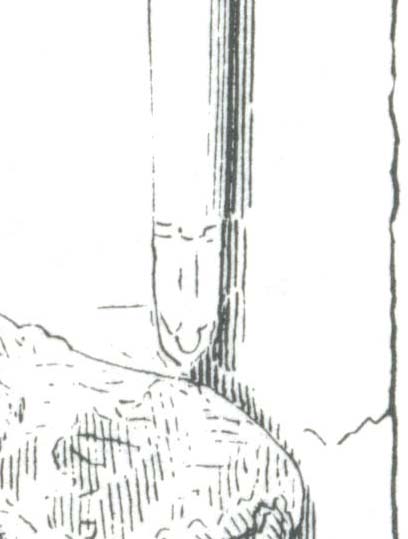
Circa 1319
 Attachment: 21.66 KB
Attachment: 21.66 KB
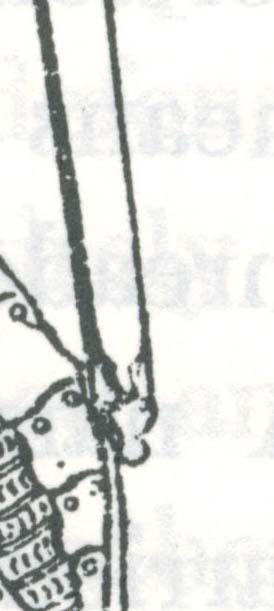
Circa 1325
 Attachment: 35.61 KB
Attachment: 35.61 KB
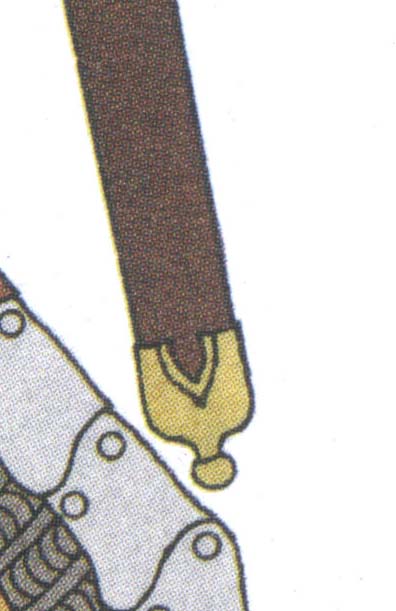
Circa 1340
 Attachment: 23.4 KB
Attachment: 23.4 KB
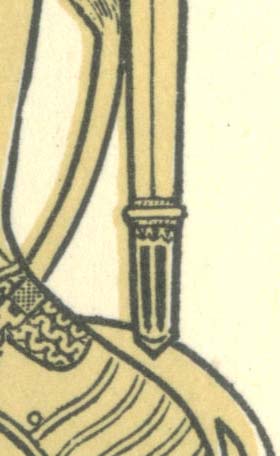
Circa 1400
 Attachment: 15 KB
Attachment: 15 KB
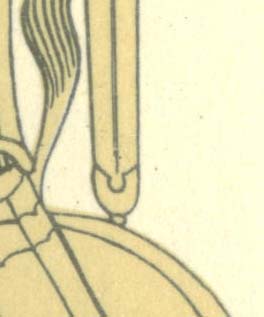
Circa 1460
 Attachment: 14.13 KB
Attachment: 14.13 KB
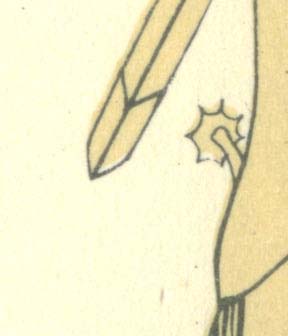
Circa 1482
 Attachment: 10.12 KB
Attachment: 10.12 KB
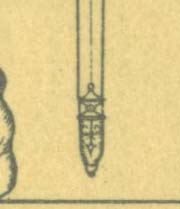
Circa 1629

Circa 1319

Circa 1325

Circa 1340

Circa 1400

Circa 1460

Circa 1482

Circa 1629
thanks for those pics
im constanty amazed at how ornate the chapes can get
im constanty amazed at how ornate the chapes can get
Looking at period art, it seems a simple U-shaped piece of metal was pretty popular, too. It's basically a piece of metal that covers the lower edge of the scabbard's point, like what is seen here:
[ Linked Image ]
I would imagine you would form it around the scabbard (like with the sword in it for stability/strength as period scabbards were made with thin slats of wood). I'd be curious to hear how folks like Christian Fletcher, Kevin Iseli, and Aaron Schnatterly form theirs from scratch.
[ Linked Image ]
I would imagine you would form it around the scabbard (like with the sword in it for stability/strength as period scabbards were made with thin slats of wood). I'd be curious to hear how folks like Christian Fletcher, Kevin Iseli, and Aaron Schnatterly form theirs from scratch.
| Chad Arnow wrote: |
| I'd be curious to hear how folks like Christian Fletcher, Kevin Iseli, and Aaron Schnatterly form theirs from scratch. |
Merv summed it up fairly well... lots of methods can be used. Some are formed in one piece about a stake, some in two halves (then brazed or welded), and some in multiple pieces built up and filed down. Casting is yet another option, especially with ornate windowed/textured pieces such as the Viking one Jeff posted, or the one Chad posted circa 1400. The various attachment methods have also been mentioned - pressure fitting, riveting, and gluing can all be appropriate.
That particular chape, pictured with Chad's Sovereign Above), began as a 1 inch x 6 inch strip of brass. I used a small ball-peen hammer and a wood block to give it it's initial U shape. The wood block has a trough carved into it, deeper at the center and shallow at both ends. Using the ball-peen to hammer the brass into the trough gives it both that "gutter" shape and starts the U bend that will eventually mirror the scabbard's tip. After that, it's just a matter of annealing and forming the chape to the scabbard, as Chad described, with sword in place. I hope this both makes sense and is at least somewhat helpful. :wtf: :D
Best,
Best,
Page 1 of 1
You cannot post new topics in this forumYou cannot reply to topics in this forum
You cannot edit your posts in this forum
You cannot delete your posts in this forum
You cannot vote in polls in this forum
You cannot attach files in this forum
You can download files in this forum
All contents © Copyright 2003-2006 myArmoury.com — All rights reserved
Discussion forums powered by phpBB © The phpBB Group
Switch to the Full-featured Version of the forum
Discussion forums powered by phpBB © The phpBB Group
Switch to the Full-featured Version of the forum